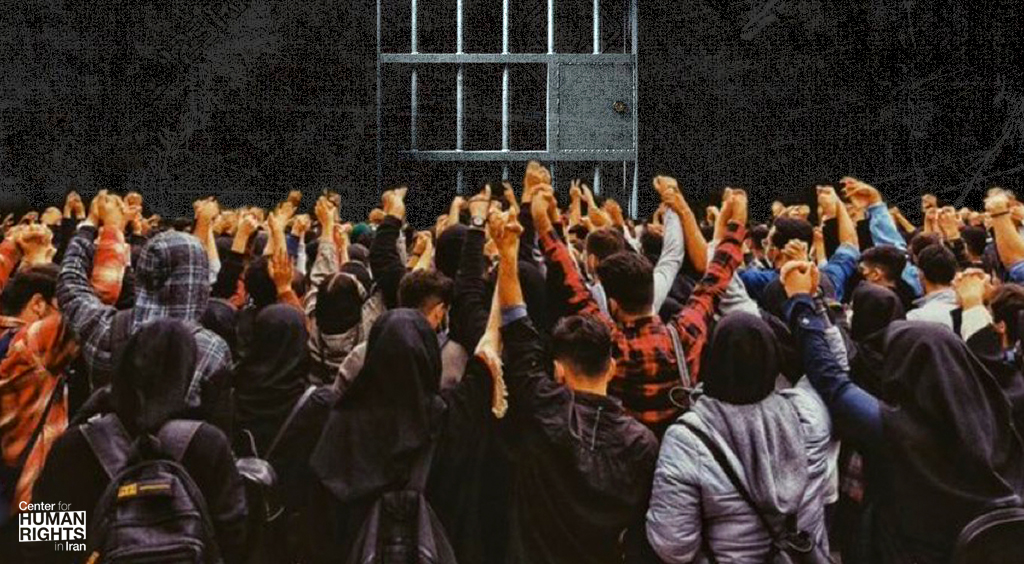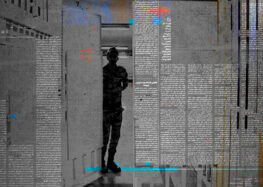Iran Protests: Detained University Students Subjected to Sexual Assault, Disappearances

At Least 574 Known Students Arrested in Less Than Three Months, Actual Number Much Higher
December 6, 2022 – Iranian police and state security forces have arrested at least 574 university students, according to research by the Center for Human Rights in Iran (CHRI), since mid-September when anti-state protests broke out across Iran.
The actual number is much higher and is being verified amid ongoing attempts by Iranian authorities to block and hinder independent media and researchers from accessing the country and contacting sources.
“Iranian university students represent the hope and future of the country, which the Islamic Republic is trying to beat into submission,” said CHRI Executive Director Hadi Ghaemi.
“Courageous students have been holding the torch of the Iranian uprising despite being beaten, arrested, and violently abused in detention,” he added. “Governments and academic communities across the world should loudly condemn the Islamic Republic’s crimes against the students.”
CHRI condemns in the strongest terms the violent suppression of protests in universities across Iran, and calls on the Islamic Republic to stop the unlawful arrests and prosecutions of protesting students, release all detained protesters, and allow students to hold demonstrations without the threat of arbitrary arrest or violence.
CHRI also urges the international community to communicate to the Iranian authorities that further diplomatic isolation and censure will follow a refusal to cease the violence against the students.
University students in Iran have been at the forefront of the country’s current protest movement for social and political change, and have been subjected to extreme violence by Islamic Republic forces, which have used beatings, teargas and the indiscriminate firing of live ammunition against the students, in addition to the mass arrests and detentions, in an effort to squash the protests.
Students Subjected to Torture and Sexual Abuse in Detainment
There have been many reports of detained male and female university students being subjected to torture and sexual abuse as well as other forms of mistreatment while in state custody, including the denial of needed medical treatment.
Many cases of sexual assaults against individuals in Iranian custody have gone unreported, due to fears of further retaliation by Islamic Republic forces.
A Kurdish-Iranian woman told CNN that she both witnessed and suffered sexual violence while detained: “There were girls who were sexually assaulted and then transferred to other cities,” she said. “They are scared to talk about these things.”
CHRI was able to obtain further details about the following three university students, who have been subjected to severe abuse, and were detained for prolonged periods without access to counsel.
Sources who spoke to CHRI for this article requested anonymity to protect themselves from reprisals by Islamic Republic forces for speaking about the cases.
Sahra Rezaei, an Afghan national and journalism student at Allameh Tabataba’i University in Tehran, has been missing since October 18, 2022, when she told her sister she was going to the university to pick up her visa extension.
In an interview with Shargh newspaper on November 26, defense lawyer Reza Shafakhah said Rezaei had been arrested but all attempts to find her in prisons, detention centers, hospitals and cemeteries in Tehran were unsuccessful.
Judicial and security authorities have not provided any explanation for her disappearance, which coincided with a visit to the university by government spokesman Ali Bahadori Jahromi.
Soha Mortezei, a former Tehran University student activist who has been repeatedly prosecuted for engaging in peaceful activism, was physically and sexually assaulted while being transferred to Evin prison after being arrested when she was tricked into leaving her dorm room on November 17, 2022.
“Officers tied Soha’s right hand to the top of one seat and her right leg to the top of another seat and while suspended, she was beaten and sexually abused by a female officer,” reported the University Students Trade Unions Council on November 27. “When she complained, she was injured with punches to the leg and stomach.”
“What happened to Soha was shocking,” a source close to Mortezaei told CHRI. “Since her arrest, friends have tried many times to visit her relatives, but their mental state is so bad that they haven’t agreed.”
The source continued, “Soha has been transferred [from Evin Prison] to Qarchak Prison in Varamin [city], but Qarchak officials initially didn’t want to accept her because of visible bruises on her body from beatings during arrest.”
Qarchak prison for women, located in Qarchak County in Tehran province, is notorious for its inhuman living conditions.
Mortezaei, who has been fighting for years to reverse the state ban on her completing her Ph.D. in political science, was in her Tehran University dormitory room when she was arrested by state security agents on the evening of November 17.
“Ms. Mortezaei was lured out of her room when she was told a friend was waiting for her outside,” a source with knowledge of the case told CHRI. “But there wasn’t any friend looking for her; it was an excuse. The agents detained her with threats and force.”
Melika Gharegozlou, a student at Allameh Tabataba’i University in Tehran, was taken to a psychiatric hospital where she was tortured.
A journalism student, Gharegozlou was arrested after security agents broke into her home on October 2, 2022, and took her to Gharchak Prison, despite a warning from her lawyer, Mohammad Ali Kamfirouzi, that doctors had advised against her being incarcerated due to her poor health.
“Her family and friends are worried that she will be slowly killed in prison, just like Behnam Mahjoubi (in February 2021),” said the University Students Trade Unions Council in a statement.
On September 19, 2022, Gharegozlou was sentenced by the Revolutionary Court to four years and four months in prison for posting a video of herself without the state-mandated headscarf. At the time of her arrest, she was free on bail, awaiting the result of her appeal.
On November 16, she was transferred to the Aminabad psychiatric hospital in Tehran against her consent and without her family and lawyer being informed.
In a phone conversation with her mother on December 3, 2022, Gharegozlou said she had started a hunger strike to protest a violent attempt to tie her to a bed and “inject an unknown substance” into her body.
“Melika’s family are under a lot of pressure not to inform the public about her condition,” a source with knowledge of the case told CHRI.
Islamic Republic forces have a documented history of using various intimidation tactics, including threats, violent interrogations, arrests, and detainments, to prevent victims and those close to them from speaking publicly about their cases.
A civil rights activist in Iran who was also transferred to the psychiatric hospital told CHRI that “Aminabad is not a hospital for mental patients but an excuse to transfer prisoners there as a form of torture.”
“We definitely know that the condition of [Gharegozlou’s] detention in this hospital is in no way acceptable because it lacks basic facilities to even treat regular patients, let alone political and religious prisoners,” added the source.
Fears of Heightened Violence Against Students as Student Day Approaches
This year, Iran’s annual Student Day, which marks the anniversary of killings by Iranian police of three University of Tehran students on December 7, 1953, coincides with the third day of a three-day national strike that has seen businesses and shops around the country close their doors in solidarity with the protesters.
Many observers fear that invigorated student protests on December 7 will be met with heightened state violence, and more arrests, detainments, abuse and disappearances.
On November 22, 2022, lawmakers introduced a bill to the Iranian parliament specifically aimed at punishing students for protesting. The bill states that students accused of joining protests would be banned from leaving the country for 10 years, forced to pay the entire cost of their education and face other disciplinary measures.
Previously, in a televised speech on October 19, Iran’s unelected Supreme Leader Ali Khamenei referred to university students who are boycotting classes in protest as “enemies of the country,” in what many view as a signal to Islamic Republic forces to target the students.
At least 18,215 people had been arrested in Iran since September, and at least 473 individuals killed by state security forces, according to the Human Rights Activists News Agency (HRANA), when the death in state custody of Mahsa (Jina) Amini sparked major protests around the country.
CHRI urges the UN, including the Working Groups on Arbitrary Detention and on Enforced or Involuntary Disappearances, and the special rapporteurs on freedom of opinion and expression, on torture and cruel, inhuman or degrading treatment, on violence against women and girls, and on human rights in Iran to condemn and investigate further these abuses.






